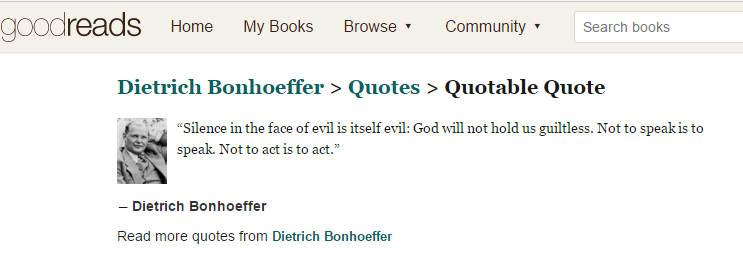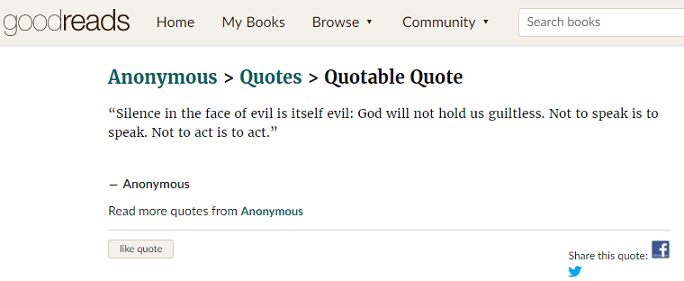On August 25, I posted research into the attribution of the following quote:
Silence in the face of evil is itself evil. God will not hold us guiltless. Not to speak is to speak. Not to act is to act.
Commonly attributed to Dietrich Bonhoeffer, I traced the quote back to a now deceased researcher at the Liberty Museum in Philadelphia who added the quote to Bonhoeffer’s exhibit in the museum. The current director of the museum did not know the source and the quote does not appear in any of Bonhoeffer’s writings according to the foremost expert on those writings, Victoria Barnett. It cannot be found before a 1998 newsletter reporting on the opening of the Liberty Museum Bonhoeffer exhibit. Eric Metaxas, author of a biography on Bonhoeffer, has used the quote frequently attributed to Bonhoeffer but has not provided a source for the quote.
Quotes like this are also spread by websites which archive quotes for use on social media. One such website is Goodreads. Today, Goodreads let me know that they have changed the attribution of the quote to “anonymous.”
Before

After

International Justice Mission and several others have also made similar changes in the use of the quote.
Good Timing
Thinking about this some more, I believe it is a good time to clear this up. So many people have enlisted Bonhoeffer through this quote for so many different and contradictory causes. Most recently, people for and against Donald Trump have tried to bring Bonhoeffer on their side. With Bonhoeffer’s aura and imprimatur, this quote is used frequently to make the justice of one’s cause seem self-evident.
Recently, Eric Metaxas used a part of it again to encourage a vote for Trump. He said “not to act is to act” and “not to vote is to vote.”
I really doubt Bonhoeffer would have agreed with the perversion of the quote. Not to vote is not to vote. One cannot vote and not vote at the same time. How is the not voting vote to be counted?
To illustrate the absurdity of just taking the form “not to ____ is to ____” and substituting one’s current cause or preoccupation, let’s take another recent blog topic: tithing. I really doubt Robert Morris would go along with “not to tithe is to tithe.” If one is hungry, it won’t fill your stomach to say, “not to eat is to eat.” Also, thinking about the silence from Metaxas on the attribution of this quote, I think it confuses things to say, “Not to take responsibility is to take responsibility,” right?
Freeing the quote from Bonhoeffer invites us to consider that it might not be as wise and universally applicable as it first seemed.

